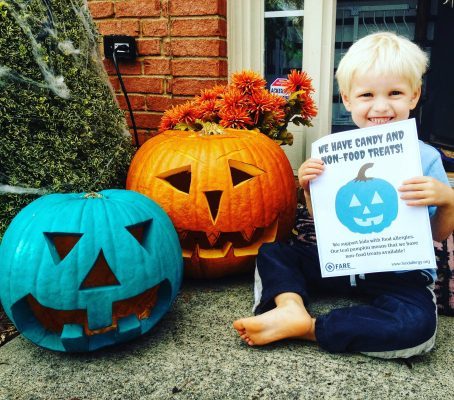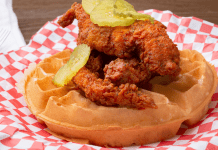When reminiscing about childhood, who doesn’t put Halloween at the top of their list of favorite holiday memories? Dressing up in a costume and running around the neighborhood collecting bags full of candy is as good as it gets. And, as moms, all we want is for our children to enjoy all of the same types of idyllic experiences that we had growing up. But, if you are raising a son or daughter with a medical issue that impacts his or her relationship with food, these nostalgic moments may not look like you imagined they would for your own child.
 Halloween may be the epic kickoff to the food-centered holidays in fall and winter, but it can feel absolutely overwhelming for many parents.
Halloween may be the epic kickoff to the food-centered holidays in fall and winter, but it can feel absolutely overwhelming for many parents.
I will never forget the first Halloween after my oldest son was diagnosed with multiple food allergies. We attended a friend’s Halloween party just weeks after he landed in the ER because of a serious allergic reaction to peanut butter. I was suddenly seeing the world with completely different eyes. While I watched people all around us peel back the wrappers of their ubiquitous Reece’s peanut butter cups, my completely unaware toddler wandered around touching every surface imaginable, just as two-year-olds do. I held my breath, did everything I could to keep him from putting his hands in his mouth, and realized at that moment that Halloween would never look the same for us.
 This same boy, now 13 years old, will spend his first Halloween this year as a recently diagnosed type 1 diabetic. And, here we are once again.
This same boy, now 13 years old, will spend his first Halloween this year as a recently diagnosed type 1 diabetic. And, here we are once again.
It’s so easy to feel overwhelmed by what we can’t change. But, what I’ve learned over the years is that just about anything is possible with little love and creativity – especially inclusion. While I will never advocate for completely eliminating food from holiday celebrations, I do believe that good things happen for all of our kids when we make some room for non-food fun at the table, as well.
3 Tips for Bringing Non-Food-Centered Activities to Halloween
- Add non-food treats and toys to your trick-or-treating stash. The Teal Pumpkin Project has swept the world with its beautifully simple message. By offering your trick-or-treaters fun non-food treats like toys, stickers, and tattoos – in addition to candy – you are ensuring that every kid will leave your house with something special to enjoy. The same goes for party favors and goodies given away at classroom parties, as well. Everyone is included, even our friends with dietary restrictions when non-food treats are a part of the mix. To learn more about the Teal Pumpkin Project, click here.
- Make pre-Halloween prep as fun as the actual night. Think about it: most holidays wouldn’t feel nearly as special if it wasn’t for all of the activities and preparation leading up to them. So, why not make a concerted effort to focus on all the fun to be had prior to Halloween night? Make picking out a costume a big deal. Head to a pumpkin patch to choose the perfect pumpkin to transform into a jack-o-lantern. Watch your favorite Halloween movie together. Decorate the house and yard with the spookiest decor you can find. Your kids will not only love these family-centered activities, but you’ll also remind them that Halloween is about so much more than just candy.
- Consider taking Halloween into your own hands. If you are able, the very best way to incorporate a variety of fun non-food activities into Halloween is to host Halloween yourself! Prior to the big night, older kids might love a ride to a corn maze or haunted house, followed by a spooky movie fest at home. If you prefer to focus on Halloween night, you can invite friends over before trick-or-treating to take part in Halloween games, pumpkin decorating, or a costume contest. Taking on a host role will give you the flexibility to make Halloween yours.
Holidays can be incredibly challenging when food is a roadblock for your kids, but there are so many ways to feel empowered as parents and make Halloween special for our children with dietary restrictions.
Be sure to check out Atlanta Mom’s Ultimate Fall Guide here.
If you are a parent of a child with food allergies or other food-related medical conditions, what are some of your favorite ways to make the food-centered holidays feel non-food-centered, fun, and inclusive? We’d love to hear from you in the comments below!

















